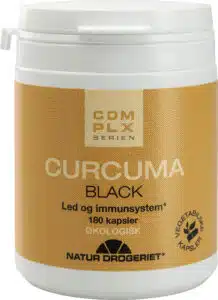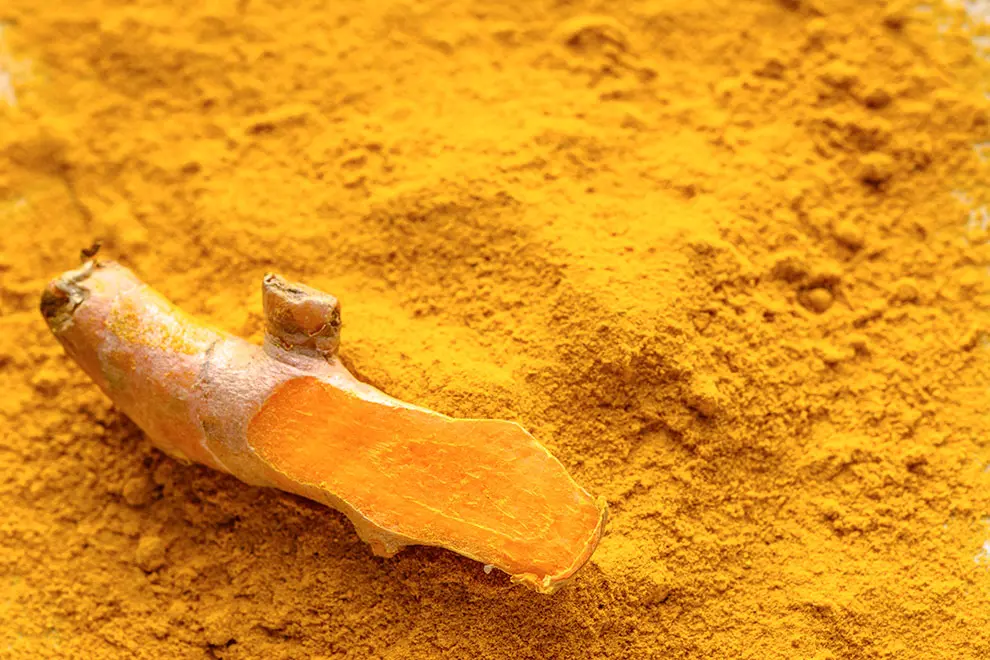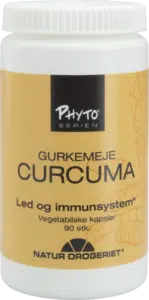Curcumin er bedst kendt for sine betændelses- og kræfthæmmende egenskaber, men nu har forskere også påvist, at gurkemejestoffet også har en sundhedsfremmende indvirkning på hjernen. I både dyreforsøg og kliniske forsøg på mennesker har stoffet vist sig at kunne
- danne nye neuroner i hippocampus
- forbedre præstationen i hukommelsestests
- reducere betændelsestilstande i nerveceller
- beskytte mod tab af hukommelse.
Curcumin er det primære aktive stof i krydderiet gurkemeje. Det er kendt som en substans, der har indvirkning på en lang række lidelser så som diabetes, leddegigt, kræft og kredsløbssygdomme. Men curcumin i sig selv optages dårligt i kroppen. Kun en lille del af den mængde, man indtager, optages i blodet, mens det meste omdannes til andre stoffer eller udskilles af kroppen. Curcumins anvendelse mod hjernelidelser er også påvirket af dets begrænsede evne til at krydse blod/hjerne-barrieren.
 Curcumins indvirkning på hjernen
Curcumins indvirkning på hjernen
Men nu har forskere fundet en måde at omgå dette problem på. Man har påvist, at indtagelse af curcumin sammen med stoffet galactomannan fra bukkehorn resulterer en mængde af frie curcuminoider i blodet, der er op til 45 gange højere end curcumin alene.
Og dermed kan stoffet komme frem til hippocampus – den del af hjernen, der spiller hovedrollen i indlæring og hukommelse.
Neurodegeneration er betegnelsen for den tiltagende beskadigelse af og funktionstab i nervecellerne, der sker med alderen og ved sygdom. Nogle af de væsentligste mekanismer ved disse sygdomme er
- kronisk inflammation, som kan beskadige hjernecellerne
- iltningsbelastning, som kan føre til celleskader
- ophobning af forkert foldede proteiner, som er skadelige for nervecellerne.
Curcumin kan modgå alle disse problemer, og det betyder, at stoffet har indvirkning på så alvorlige lidelser som Parkinsons, Alzheimers, multipel sklerose og de skader, der opstår efter blodpropper og hjerneblødninger.

Læs også
Gurkemeje – en stærk antioxidant
Gurkemeje: Kemi og farmakologi
Curcumin er sikkert og effektivt mod slidgigt
Curcumin medvirker til at forbedre immunfunktionen
Stof i kaffe kan måske beskytte mod Alzheimers og Parkinsons
Bananer mindsker risikoen for slagtilfælde
Forebyg kræft i hjernen hos nyfødte med multivitaminer
Kilder
Voulgaropoulou SD et al. The effect of curcumin on cognition in Alzheimer’s disease and healthy aging: A systematic review of pre-clinical and clinical studies. Brain Res. 2019 Dec 15;1725:146476.
Yu Y, Shen Q, Lai Y et al. Anti-inflammatory Effects of Curcumin in Microglial Cells. Front Pharmacol. 2018;9:386.
Sunny A, Ramalingam K, Das S et al. Bioavailable curcumin alleviates lipopolysaccharide-induced neuroinflammation and improves cognition in experimental animals. Pharmacognosy Magazine. 2019 April 1, 2019;15(62):111-7.
Khanna A, Das SS, Kannan R et al. The effects of oral administration of curcumin-galactomannan complex on brain waves are consistent with brain penetration: a randomized, double-blinded, placebo-controlled pilot study. Nutr Neurosci.2020 Dec 9:1-10.
Dong S et al. Curcumin enhances neurogenesis and cognition in aged rats: implications for transcriptional interactions related to growth and synaptic plasticity. PLoS One.2012;7(2):e31211.
Kumar D et al. Enhanced bioavailability and relative distribution of free (unconjugated) curcuminoids following the oral administration of a food-grade formulation with fenugreek dietary fibre: A randomised double-blind crossover study. Journal of Functional Foods. 2016;22:578-87.
Krup V, Prakash L, Harini A. Pharmacological activities of turmeric (Curcuma longa Linn): a review. J Homeop Ayurv Med. 2013;2(133):2167-1206.1000133.
Daily JW, Yang M, Park S. Efficacy of Turmeric Extracts and Curcumin for Alleviating the Symptoms of Joint Arthritis: A Systematic Review and Meta-Analysis of Randomized Clinical Trials. JMed Food. 2016 Aug;19(8):717-29.
Dei Cas M, Ghidoni R. Dietary Curcumin: Correlation between Bioavailability and Health Potential. Nutrients. 2019 Sep 8;11(9):2147.
Stohs SJ, Chen O, Ray SD, et al. Highly Bioavailable Forms of Curcumin and Promising Avenues for Curcumin-Based Research and Application: A Review. 2020 Mar 19;25(6).
Di Meo F, Margarucci S, Galderisi U, et al. Curcumin, Gut Microbiota, and Neuroprotection. Nutrients. 2019 Oct 11;11(10).
Kannan RG, Abhilash MB, Dinesh K, et al. Brain regional pharmacokinetics following the oral administration of curcumagalactomannosides and its relation to cognitive function. Nutr Neurosci.2021 Apr 20:1-12.
Pandaran Sudheeran S, Jacob D, Natinga Mulakal J, et al. Safety, Tolerance, and Enhanced Efficacy of a Bioavailable Formulation of Curcumin With Fenugreek Dietary Fiber on Occupational Stress: A Randomized, Double-Blind, Placebo-Controlled Pilot Study. J Clin Psychopharmacol. 2016 Jun;36(3):236-43.
Walker KA. Inflammation and neurodegeneration: chronicity matters. Aging (Albany NY). 2018 Dec 16;11(1):3-4.
Kim GH, Kim JE, Rhie SJ, et al. The Role of Oxidative Stress in Neurodegenerative Diseases. Exp Neurobiol.2015 Dec;24(4):325-40.
Chen X, Guo C, Kong J. Oxidative stress in neurodegenerative diseases. Neural Regen Res.2012 Feb 15;7(5):376-85.
Abrahams S, Haylett WL, Johnson G, et al. Antioxidant effects of curcumin in models of neurodegeneration, aging, oxidative and nitrosative stress: A review. 2019 May 15;406:1-21.
Balogun E, Hoque M, Gong P, et al. Curcumin activates the haem oxygenase-1 gene via regulation of Nrf2 and the antioxidant-responsive element. Biochem J.2003 May 1;371(Pt 3):887-95.
Brandes MS, Gray NE. NRF2 as a Therapeutic Target in Neurodegenerative Diseases. ASN Neuro.2020 Jan-Dec;12:1759091419899782.
Hatcher H, Planalp R, Cho J, et al. Curcumin: from ancient medicine to current clinical trials. Cell Mol Life Sci. 2008 Jun;65(11):1631-52.
Conboy L, Foley AG, O’Boyle NM, et al. Curcumin-induced degradation of PKC delta is associated with enhanced dentate NCAM PSA expression and spatial learning in adult and aged Wistar rats. Biochem Pharmacol.2009 Apr 1;77(7):1254-65.
Ng TP, Chiam PC, Lee T, et al. Curry consumption and cognitive function in the elderly. Am J Epidemiol. 2006 Nov 1;164(9):898-906.
Beitz JM. Parkinson’s disease: a review. Front Biosci (Schol Ed).2014 Jan 1;6:65-74.
https://www.ncbi.nlm.nih.gov/books/NBK470193/.
Hauser DN, Hastings TG. Mitochondrial dysfunction and oxidative stress in Parkinson’s disease and monogenic parkinsonism. Neurobiol Dis.2013 Mar;51:35-42.
Wang XS, Zhang ZR, Zhang MM, et al. Neuroprotective properties of curcumin in toxin-base animal models of Parkinson’s disease: a systematic experiment literatures review. BMC Complement Altern Med. 2017 Aug 17;17(1):412.
Wang Y-L, Ju B, Zhang Y-Z, et al. Protective effect of curcumin against oxidative stress-induced injury in rats with Parkinson’s disease through the Wnt/-catenin signaling pathway. Cellular Physiology and Biochemistry. 2017;43(6):2226-41.
Jagatha B, Mythri RB, Vali S, et al. Curcumin treatment alleviates the effects of glutathione depletion in vitro and in vivo: therapeutic implications for Parkinson’s disease explained via in silico studies. Free Radic Biol Med. 2008 Mar 1;44(5):907-17.
Stefanis L. alpha-Synuclein in Parkinson’s disease. Cold Spring Harb Perspect Med.2012 Feb;2(2):a009399.
Sharma N, Nehru B. Curcumin affords neuroprotection and inhibits alpha-synuclein aggregation in lipopolysaccharide-induced Parkinson’s disease model. 2018 Apr;26(2): 349-60.
Pandey N, Strider J, Nolan WC, et al. Curcumin inhibits aggregation of alpha-synuclein. Acta Neuropathol. 2008 Apr;115(4):479-89.
Walton C, King R, Rechtman L, et al. Rising prevalence of multiple sclerosis worldwide: Insights from the Atlas of MS, third edition. Mult Scler. 2020 Dec;26(14):1816-21.
Qureshi M, Al-Suhaimi EA, Wahid F, et al. Therapeutic potential of curcumin for multiple sclerosis.Neurol Sci. 2018 Feb;39(2):207-14.
Mohajeri M, Sadeghizadeh M, Najafi F, et al. Polymerized nano-curcumin attenuates neurological symptoms in EAE model of multiple sclerosis through down regulation of inflammatory and oxidative processes and enhancing neuroprotection and myelin repair. 2015;99:156-67.
Natarajan C, Bright JJ. Curcumin inhibits experimental allergic encephalomyelitis by blocking IL-12 signaling through Janus kinase-STAT pathway in T lymphocytes. J Immunol.2002;168(12):6506-13.
Schreiber AK, Nones CF, Reis RC, et al. Diabetic neuropathic pain: Physiopathology and treatment. World J Diabetes.2015 Apr 15;6(3):432-44.
Joshi RP, Negi G, Kumar A, et al. SNEDDS curcumin formulation leads to enhanced protection from pain and functional deficits associated with diabetic neuropathy: an insight into its mechanism for neuroprotection. Nanomedicine: Nanotechnology, Biology and Medicine. 2013;9(6):776-85.
Sharma S, Kulkarni SK, Agrewala JN, et al. Curcumin attenuates thermal hyperalgesia in a diabetic mouse model of neuropathic pain. Eur J Pharmacol.2006 May 1;536(3):256-61.
Cameron NE, Cotter MA. Pro-inflammatory mechanisms in diabetic neuropathy: focus on the nuclear factor kappa B pathway. Curr Drug Targets.2008 Jan;9(1):60-7.
Zhao WC, Zhang B, Liao MJ, et al. Curcumin ameliorated diabetic neuropathy partially by inhibition of NADPH oxidase mediating oxidative stress in the spinal cord. Neurosci Lett.2014 Feb 7;560:81-5.
Jiang J, Wang W, Sun YJ, et al. Neuroprotective effect of curcumin on focal cerebral ischemic rats by preventing blood-brain barrier damage. Eur J Pharmacol. 2007 Apr 30;561(1-3):54-62.
Zhao J, Yu S, Zheng W, et al. Curcumin improves outcomes and attenuates focal cerebral ischemic injury via antiapoptotic mechanisms in rats. Neurochem Res. 2010 Mar;35(3):374-9.
Wang Q, Sun AY, Simonyi A, et al. Neuroprotective mechanisms of curcumin against cerebral ischemia-induced neuronal apoptosis and behavioral deficits. J Neurosci Res.2005 Oct 1;82(1):1 38-48.
Huang L, Chen C, Zhang X, et al. Neuroprotective Effect of Curcumin Against Cerebral Ischemia-Reperfusion Via Mediating Autophagy and Inflammation. J Mol Neurosci.2018 Jan;64(1): 129-39.
Wang BF, Cui ZW, Zhong ZH, et al. Curcumin attenuates brain edema in mice with intracerebral hemorrhage through inhibition of AQP4 and AQP9 expression. Acta Pharmacol Sin. 2015 Aug;36(8):939-48.
https://www.ncbi.nlm.nih.gov/books/NBK299195/
Readnower RD, Chavko M, Adeeb S, et al. Increase in blood-brain barrier permeability, oxidative stress, and activated microglia in a rat model of blast-induced traumatic brain injury. J Neurosci Res. 2010 Dec;88(16):3530-9.
Laird MD, Sukumari-Ramesh S, Swift AE, et al. Curcumin attenuates cerebral edema following traumatic brain injury in mice: a possible role for aquaporin-4? J Neurochem. 2010 May;113(3):637-48.
Zhu HT, Bian C, Yuan JC, et al. Curcumin attenuates acute inflammatory injury by inhibiting the TLR4/MyD88/NF-kappaB signaling pathway in experimental traumatic brain injury. J Neuroinflammation. 2014 Mar 27;11(1):59.
Wu A, Ying Z, Gomez-Pinilla F. Dietary curcumin counteracts the outcome of traumatic brain injury on oxidative stress, synaptic plasticity, and cognition. Exp Neurol.2006 Feb;197(2):309-17


 Curcumins indvirkning på hjernen
Curcumins indvirkning på hjernen